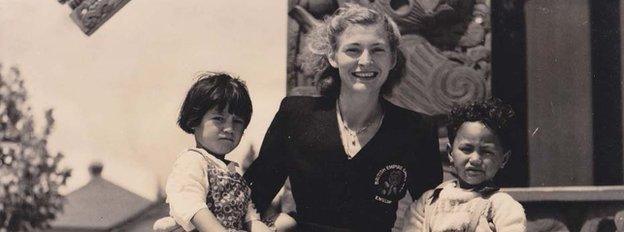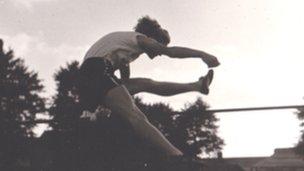'My mum competed in the 1948 Olympics'
- Published

High jump athlete Bertha Crowther also participated in the Empire Games in New Zealand
Rose Deche's mother was an athlete who competed during the Olympic games of 1948 in high jump and hurdles.
She describes the determination behind her sporting achievements.
"My mum competed in the Olympic Games of 1948 in high jump and hurdles. She also took part in the 1950 Commonwealth Games in New Zealand as well as the European Games at that time.
Her name was Bertha Crowther, she died exactly five years ago.
She had an amazing experience competing internationally. She came 6th during the 1948 Olympics and got much better in the Commonwealth Games.
Her experience as an athlete in those years couldn't have been more different from today's athletes.
She was born in Wembley in 1921 and was very determined from an early age to become an athlete. She used to peddle her bicycle to the local park for training after school with two hurdles on the back of the bike.
They used to jump onto sand in those days, they didn't have the soft padding to land on.

Bertha Crowther came 6th at the 1948 Olympic games in London
If the sand was wet, you could get lots of injuries. It was quite painful and I remember she had bruises all the time, but she kept going.
They were doing the scissors jump, where one leg crosses the bar before the other. The jump wasn't as high as it is now, you had to land on your feet, not on your back.
The style of the jump has changed several times in order to achieve these amazing heights. At first it was the scissors jump, then it was western roll, then it was the straddle. And at 5 foot 9 inches she wasn't tall, compared to the high jumpers of today.
'Sheer determination'
I don't think people realise the amount of work that goes into these medals. It's a life commitment. My mum didn't start her family until her 30s, thankfully my dad was there all along to support her.
There wasn't any funding for her. She was lucky that she was born in Wembley so she could use the Wembley sports facilities.
What she achieved was through sheer determination. She knew she wanted to be in the Olympics since she was in primary school.
She was highly competitive, she came from an era when winning was everything.
Things are very different now. Facilities have improved hugely, technically everything is better, there's a much greater network of clubs even at a primary school level, a lot more coaching and network support.
But nowadays nobody competes with anybody. I am a secondary teacher and I know our kids shy away from competing.
On sports days, pupils don't go out to support their mates. Sports are happening, but there isn't the ethos of winning. I think that is bad. Not everyone can be good academically and kids who are good at sports should be encouraged.
I hope the fantastic results we are getting at these games will help change that attitude."
- Published6 August 2012
- Published8 August 2012